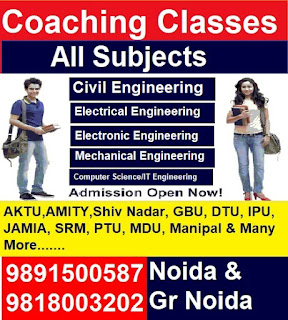BTech Coaching/Tuition Classes For Electrical Engineering(EEE101/EEE201)
BTech Coaching/Tuition Classes For Electrical Engineering(EEE101/EEE201)
D C Circuit Analysis and Network Theorems:
Circuit Concepts: Concepts of network, Active and passive elements, voltage and current sources, concept of linearity and linear network, unilateral and bilateral elements, R, L and C as linear elements, source transformation.
Kirchhoff's laws; loop and nodal methods of analysis; star-delta transformation; Network Theorems: Superposition Theorem, Thevenin's Theorem, Norton's Theorem, Maximum Power Transfer Theorem (simple numerical problems).
Steady- State Analysis of Single Phase AC Circuits:
AC Fundamentals: Sinusoidal, square and triangular waveforms – average and effective values, form and peak factors, concept of phasors, phasor representation of sinusoidally varying voltage and current. Analysis of series, parallel and series-parallel RLC Circuits: apparent, active & reactive powers, power factor, causes and problems of low powerfactor, powerfactor improvement; resonance in series and parallel circuits, bandwidth and quality factor (simple numerical problems).
Three Phase AC Circuits:
Three phase system-its necessity and advantages, meaning of phase sequence, star and delta connections, balanced supply and balanced load, line and phase voltage/current relations, three-phase power and its measurement (simple numerical problems).
Measuring Instruments:
Types of instruments, construction and working principles of PMMC and moving iron type voltmeters & ammeters, single phase dynamometer wattmeter and induction type energy meter, use of shunts and multipliers (simple numerical problems on energy meter, shunts and multipliers).
Introduction to Power System:
General layout of electrical power system and functions of its elements, standard transmission and distribution voltages, concept of grid (elementary treatment only).
Magnetic Circuit:
Magnetic circuit concepts, analogy between electric & magnetic circuits, magnetic circuits with DC and AC excitations, magnetic leakage, B-H curve, hysteresis and eddy current losses, magnetic circuit calculations, mutual coupling.
Single Phase Transformer:
Principle of operation, construction, e .m. f. equation, equivalent circuit, power losses, efficiency (simple numerical problems), introduction to auto transformer.
Electrical Machines:
Principles of electro mechanical energy conversion,
DC machines: types, e. m. f. equation of generator and torque equation of motor, characteristics and applications of dc motors (simple numerical problems).
Three Phase Induction Motor: types, Principle of operation, slip-torque characteristics, applications (numerical problems related to slip only).
Single Phase Induction motor: Principle of operation and introduction to methods of starting, applications.
Three Phase Synchronous Machines: Principle of operation of alternator and synchronous motor and their applications.
For More Details Contact
NOIDA Office: C-Block, Near Gate Number - 3, Sec-52, Opposite Hoshiyaar Pur, NOIDA,9560308924, 9891500587
Thanks and Regards
C-F-A Academy Of Career Development
(A Unit of Pushti Infotech Pvt. Ltd.)
C-28, Sec-52, NOIDA
Ph: 9891500587, 9650308924
Email: enquiry.cfa@gmail.com
Website: www.cfaacd.com
www.cfaacd.blogspot.com
C-F-A Academy Of Career Development
(A Unit of Pushti Infotech Pvt. Ltd.)
C-28, Sec-52, NOIDA
Ph: 9891500587, 9650308924
Email: enquiry.cfa@gmail.com
Website: www.cfaacd.com
www.cfaacd.blogspot.com










Comments